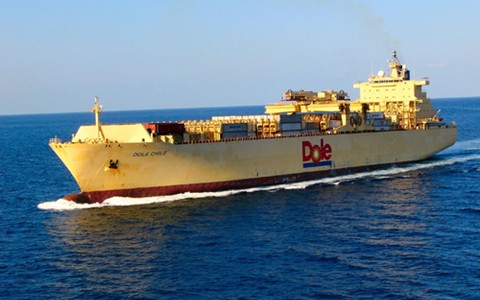
The ship above, the gargantuan M/V Dole Chile, was recently found to be carrying $2 million worth of cocaine into Delaware’s main port. The drugs were stashed in the ventilation system of a container loaded with bananas, which the ship delivers weekly to the Port of Wilmington. All in all, a nice little catch for U.S. Customs and Border Protection, whose officers routinely inspect fruit shipments for evidence of invasive insects.
But the seizure also underscores the utter futility of interdiction strategies. As noted on the ship’s specs page, the M/V Dole Chile carries 2,000 TEU containers when fully loaded. According to this detailed 2006 study, an inspection team can X-ray 20 such containers per hour. Assuming that inspectors have roughly half a work day to clear a ship, then, less than 5 percent of the M/V Dole Chile‘s cargo gets scanned during any one visit.
More importantly, it’s not clear that a $2 million shipment of cocaine, which consists of just 26 two-and-a-half pound bricks, can reliably be detected via X-rays that are taken and interpreted in a three-minute span. That means such contraband can only be discovered through hand inspections. And the RAND study asserts that a five-person customs team can only conduct one search per day.
Given that the Port of Wilmington alone handles a new vessel every day, any drug lord worth his salt would have to like his long-term odds—especially since there’s no risk to human assets. Is it any wonder they can afford such first-class personal zoos?


tsg // Jun 15, 2010 at 10:08 am
Drugs are hardly the only contraband that can easily slip through customs undetected.
Brendan I. Koerner // Jun 15, 2010 at 10:21 am
@tsg: Indeed. Though you do need contraband profitable/important enough to arrange for pickup, too. The other half of the smuggling equation is actually getting the stuff out of its hiding place, after all. I’m guessing that the Port of Wilmington has a few bad eggs on its staff.
Brendan I. Koerner // Jun 15, 2010 at 10:22 am
@tsg: Wait, check that–didn’t account for the realities of containerization. Drugs would likely be liberated upon reaching their final destination via ground transport—some sort of fruit wholesaling operation, I presume.
Gotta admire the coordination at work here.
tsg // Jun 15, 2010 at 11:12 am
@Brendan:
Have you seen the HBO series “The Wire”? Season 2 mines this vein extensively, with the Port of Baltimore as the setting.
What concerns me is that if it’s so easy to smuggle drugs, humans, counterfeit handbags, etc, that you have to assume smuggling really nasty weapons is equally easy. Happily it’s only been profit seeking criminal enterprises who’ve been exploiting the weaknesses of our ports to this point.
Jordan // Jun 15, 2010 at 12:14 pm
Man, other business people must dream of having the kind of economics that drugs do. The inputs are usually cheap and almost infinitely scalable. The relatively inelastic demand means that any increases in cost, either in terms of production or distribution, can be passed directly on to the customers. Hard to come up with a sweeter gig than that. Well, except for the whole getting killed or thrown in jail business. But even that doesn’t seem to stop many people. Just another cost of doing business.
Which is sadly also the attitude of many more legitimate businesses towards regulations and fines.
Brendan I. Koerner // Jun 15, 2010 at 1:25 pm
@tsg: My favorite season. (Best line: “And I’m not even Greek!”) IIRC, the dock workers had a nifty way of making containers “disappear,” so that they were never logged as having come into the port. I do wonder about the feasibility of that scheme in the post-9/11 Era. I certainly hope we’ve done something to close that vulnerability, but I sorta doubt it.
@Jordan: I’m constantly amazed by the inability of regulators to recognize that fines must be high enough to discourage proscribed behavior. I recently saw something about a major chemical company being fined something like $7 million for what seemed like a very substantial violation. That’s probably about what the company spends on machine coffee every year.
Russ Mitchell // Jun 15, 2010 at 10:21 pm
Legalize drugs now.